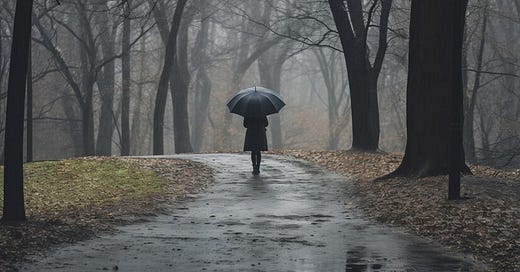Loneliness, a paradoxical affliction of the modern mind, is both a product of our hyper-connected world and a testament to our innate human nature.
One might think loneliness would be easily conquered in a world of constant connectedness, bustling cities, and endless digital distractions. And yet, like an unwelcome spectre, it haunts the recesses of our psyche, emerging in the quiet moments between the noise.
Loneliness is a state of perceived isolation. It arises not necessarily from physically being alone but rather from feeling alone in our innermost thoughts and feelings, disconnected from a true sense of understanding and belonging.
The existentialists recognised the inherent loneliness of the human condition—that even surrounded by others, we are each an island of consciousness, forever somewhat unknowable.
In loneliness, we are left alone with our thoughts. And therein lies both the tragedy and, potentially, the strange gift. Our mind turns inward, meditating, overanalysing, berating, and bemoaning our solitary state.
Baudelaire lamented that "there are days when the sun seems to shine mockingly upon the loneliness of the heart." Yet perhaps there is a hidden invitation here—to finally spend time with the one person we can never escape: ourselves.
Embracing solitude in the void of loneliness, we are compelled to dig deeper into our minds.
The thoughts and emotions we typically evade can no longer be escaped. We must sit with them patiently, observing the intricate, tangled workings of our inner world. Both meditation masters and philosophers have praised the virtue of solitude for fostering self-knowledge and mental clarity.
Ofcourse, they are used in excess, and self-contemplation risks devolving into morbid rumination and narcissistic spirals. But in moderation, reflecting in solitude can yield profound realisations and a renewed appreciation for humanity.
Loneliness also breeds a deep longing to reach out and connect, to love and feel loved and to touch and be touched by the spark of another soul.
Loneliness, one of life's great paradoxes, is a feeling we all experience. In our darkest moments, we may believe we are uniquely and cosmically isolated. Yet, loneliness is perhaps the most universal human emotion.
Recognising this can be strangely comforting—we are, in fact, bound together in our loneliness, part of a silent solidarity.
Ultimately, loneliness is a bridge we must all traverse in life's journey. Like any hardship, it comes bearing gifts for those willing to receive them: self-insight, emotional resilience, and profound gratitude for those precious moments of genuine connection.
As Thoreau wrote, "I never found a companion that was so companionable as solitude." Maybe by befriending our loneliness, we move one step closer to befriending ourselves.



